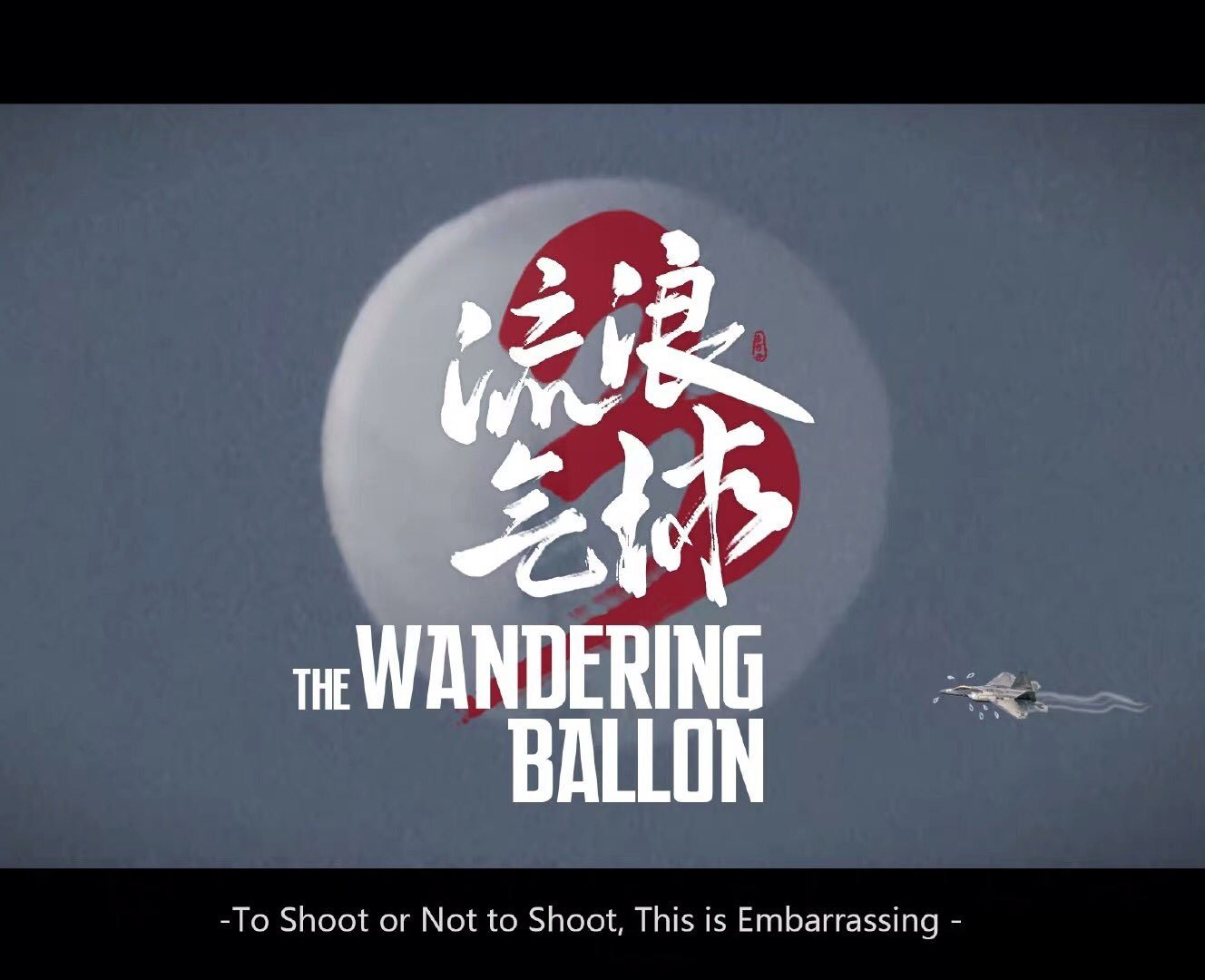Calling a deer a tiger: How the wandering spy balloon is being discussed in China
"Wandering Balloon" discussions from both sides of the firewall
Welcome to RealTime Mandarin!
It’s a free weekly resource helping you learn contemporary Chinese in context, maintain and improve your Mandarin skills, and stay on top of the latest language trends in China.
Subscribe now to get the next newsletter in your inbox on Saturday.
The "Wandering Balloon incident" (流浪气球事件 liúlàng qìqiú shìjiàn) dominated news, newsletters, and Tweets in the China watching world all week.
I thought about scrapping the idea to write about it. But then I found this sentence which translates into superb Chinglish:
“Wandering Balloon” and the faces of US sentient beings: The Republican Party "pointed at a deer as a tiger"; The Democratic Party "saved respect overnight".
“流浪气球”与美国众生相:共和党“指鹿为虎”,民主党“连夜挽尊”
Decision made! There's enough in here to take an entire newsletter to explain!
The arrival of the Chinese balloon in US airspace coincided with the screening of the Chinese blockbuster sci-fi Wandering Earth 2 (流浪地球 liúlàng dìqiú) in American cinemas, as one internet commentator noted:
As the Chinese people are hotly discussing Wandering Earth 2, Americans are talking about the Wandering Balloon.
中国人在热议流浪地球美国人在热议流浪气球
Metaphors of movies and performances flow through discussions, a nod to the ‘real life’ Wandering Balloon blockbuster unfolding.
The language used by officials in the US and China to describe the balloon is totally different. It's a "spy balloon" (间谍气球 jiàndié qìqiú) to the Americans; it's an "unmanned civilian airship" (民用无人飞艇 mínyòng wúrén fēitǐng) in Chinese press briefings.
But how commentators talked about it on both sides of the firewall, and of the debate, is similar: Dropping idioms like "taking things too far" (煞有介事), "turning trivial matters into major issues" (小题大做), and “seeing the enemy at every turn” (草木皆兵).
So this week’s linguistic wanderings take us on a journey through how the Wandering Balloon is being discussed in the Chinese language media inside and outside of China.
Enjoy!
🎧 What you’re missing in the member podcast🎧
This week’s member podcast is live and includes 25 minutes of amazing native Chinese audio.
Favourite Five
1. 挽尊 wǎn zūn
save face
共和党“指鹿为虎”,民主党“连夜挽尊” - The Republican Party "pointed at a deer as a tiger". The Democratic Party could only follow suit in order to save face. [3]
Note: Internet slang meaning to ‘get one’s respect back’ after losing face.
2. 大戏 dà xì
grand show
一部由美国政客导演的“流浪气球”大戏也在美国上演 - The grand show of “Wandering Balloon” orchestrated by American politicians is also taking place in the US. [2]
Related: 表演 biǎo yǎn - performance (negative connotation)
3. 朝野 cháo yě
the government and the opposition party
这架无辜的偏航无人飞艇成为了美国朝野恶斗的靶子 - This unmanned airship that was helplessly blown off course is caught in the crossfire of the ugly political struggle in the US. [3]
4. 草木皆兵 cǎo mù jiē bīng
every bush and tree looks like an enemy, paranoid
现在美国人对中国真的是草木皆兵了 - Tensions are very high in the US about China. [5]
Related: We discussed this before in October last year. It's part of a longer phrase: 风声鹤唳,草木皆兵 fēng shēng hè lì, cǎo mù jiē bīng.
5. 指鹿为虎 zhǐ lù wéi hǔ
pointing at a deer and calling it a tiger
“流浪气球”与美国众生相:共和党“指鹿为虎”,民主党“连夜挽尊” - How the “Wandering Balloon” has been interpreted in the US: The Republican Party "pointing at a deer and calling it a tiger". The Democratic Party could only follow suit. [3]
More: We discuss this more in The China Project Phrase of the Week. This is a newly coined idiom from the original 指鹿为马 - “pointing at a deer and calling it horse”, which means to distort the facts.
Consuming the Conversation
Useful words
6. 谬 miù
wrong
绝不是美方谬称的所谓“间谍飞行器” - This is absolutely not what the US alleges: a “spy balloon”. [3]
Related:
荒谬 huāng miù - absurd
谬误 miù wù - mistake (formal, literary)
7. 互疑 hù yí
mutual distrust
这种战略互疑的强化使得双方看对方的每一步动作都觉得不怀好意 - The increasing mutual strategic distrust makes both sides feel hostile to each other's every move. [1]
Related: 互信 hù xìn - mutual trust
8. 闹剧 nào jù
farce
前者讲述了地球危机下人类的团结自救,而后者则是令人啼笑皆非的闹剧 - The former is about bringing mankind together in the face of a crisis, while the latter is a laughable farce. [2]
Note: Carrying on with the cinema metaphor.
9. 外溢 wài yì
overflow into; spill over
美国两党恶斗的外溢效应已经严重影响了美国的外交政策制定 - The spillover of the vicious struggle between the two parties in the United States has seriously affected its foreign policy. [3]
10. 恶斗 è dòu
ugly fight
这是美国民主共和两党新一轮恶斗,是一次典型带有政党色彩的舆论文宣战 - This latest round of fierce struggle between the Democratic and Republican parties in the United States is a typical act of propaganda that aims to sway the public opinion in their favour. [3]
11. 栽赃 zāi zāng
to set sb up, to frame sb
美国两党相互攻击的格局决定了一定要拔高事情的意义,使栽赃和强硬占上风 - The pattern of mutual attacks between the two parties in the United States determines that the significance of the matter must be exaggerated, so that framing and toughness will prevail. [4]
Three-character phrases
12. 众生相 zhòng shēng xiàng
sentient beings; all the people
“流浪气球”与美国众生相:共和党“指鹿为虎”,民主党“连夜挽尊” - How the “Wandering Balloon” has been interpreted in the US: The Republican Party "pointed at a deer as a tiger". The Democratic Party could only follow suit. [3]
More: This is a Buddhist term meaning sentient beings, or gods. In contemporary Chinese it can also mean "ordinary people", here it’s referring to the political parties. We discussed this before in January 2022.
13. 犯不着 fàn bu zháo
not worth it
咱们犯不着放个气球过去一探究竟 - There’s no need for us to send a balloon over to check it out. [3]
14. 下马威 xià mǎ wēi
secure a leading position over the opponent from the very beginning
美国一边对布林肯访华不断放风,一边却加码围堵和打压中国,这实在不是为访华营造好的氛围,而是要给中国下马威 - The U.S. is hinting at Blinken’s visit to China, while stepping up its efforts to contain and suppress Beijing. This is to flex its muscles over China rather than creating a good atmosphere for the visit. [1]
Idioms
15. 煞有介事 shà yǒu jiè shì
make a big fuss about something
美国大炮轰蚊子,撒尿淹蚂蚁,煞有介事,小题大做,也是很好笑 - America is using a missile to kill a mosquito, pissing on ants to drown them, making a big fuss about nothing. It’s laughable. [5]
16. 小题大做 xiǎo tí dà zuò
make a big fuss about a small thing
媒体和政客大肆炒作该事,是在“小题大做”,借之“抹黑”和攻击中国 - The media and politicians are hyping up the matter. They are making a big deal out of a small thing and using it to smear and attack China. [1]
17. 如临大敌 rú lín dà dí
as if the archenemy is here
一个气球就如临大敌,说明啥? 多行不义必心虚 - They treat a balloon like an enemy - what does it mean? Many acts of unrighteousness only reveal a guilty conscience. [5]
18. 不堪一击 bù kān yì jī
taken out with a single blow
围绕此事的外交角力反映双方的关系已脆弱到不堪一击 - The reaction has shown the diplomatic relationship between the two countries is so weak that it can be taken out with a single shot. [1]
19. 真刀真枪 zhēn dāo zhēn qiāng
real knife, real gun; a real fight
他们就希望美中关系自由落体下坠,最好双方真刀真枪地打一仗 - They hope the relationship between the United States and China will go into free fall, ideally leading to the two sides to fight a real war. [1]
20. 众目睽睽 zhòng mù kuí kuí
in full view
数位与资讯时代的间谍设备,很难想像会是一个众目睽睽之下的气球模样 - It’s hard to imagine that spy equipment in the digital and information age will look like a balloon in full view. [2]
21. 一言以蔽之 yī yán yǐ bì zhī
in a nutshell
一言以蔽之,共和党“指鹿为虎”,民主党“连夜挽尊” - In a word: The Republican Party "pointed at a deer as a tiger". The Democratic Party could only follow suit in order to save face. [3]
Note: Although this is five characters, it is classed as an idiom.
Phrases
22. 小事化大 xiǎo shì huà dà
make something small into something big
是小事化大、无风起浪,本质上是一次面“对中国谁更强硬”的朝野斗狠 - They are turning a small matter into a big one, creating something out of nothing. It is essentially to show which of the political parties is “tougher on China?” [3]
Note: Opposite to 大事化小 dà shì huà xiǎo ‘covering up important issues’ which we discussed in last week’s newsletter.
23. 脸往哪搁 liǎn wǎng nǎ gē
where to put face; how to save face
美国是一定要击落气球的,要不,脸往哪搁 - The US has to shoot this balloon down. Otherwise, how can it save face? [5]
24. 醉翁之意不在酒 zuì wēng zhī yì bú zài jiǔ
A drunkard drinks not for the liquor; having an ulterior motive
醉翁之意不在酒,美国这是对中国的一种宣示,进入我领空,我想击落就击落 - The US has a different objective. It’s a declaration to China: if you enter our airspace, we will shoot you down. [5]
Note: We discussed this in January this year.
Become a member of RealTime Mandarin+
The RealTime Mandarin+ membership is a multimedia resource helping you learn contemporary Chinese in context
If you enjoyed reading the free newsletter, you’ll LOVE our paid membership: RealTime Mandarin+.
Joining Real-Time-Mandarin+, you’ll unlock loads of extra resources to help you dramatically improve your Chinese language skills.
Every week you get access to new content:
🔈Podcast - 30 min podcast every Saturday with 80% native Mandarin (including transcript)
📚 Resources and integrations - Pleco, Skritter, Hack Chinese, mylingua (new!), and PDF printouts
👩🎓 Intermediate newsfeed - One ‘real’ Chinese language news podcast and article published every Sunday, in a lesson format, pitched at an intermediate level
💬 Community - Slack community, Substack Chat, online meet-ups, in-person gatherings
🤿 Quarterly Deep Dives - One hour webinars focussing on one key challenge of intermediate learners delivered around the end of every quarter.
When you join, you’ll also have an optional 1-1 onboarding and coaching call to help orientate you.
It’s the best way to get motivated, inspired, and kick-start your Mandarin learning habit.
You can access all of these resources for less than the cost of one pint per week in a London pub.
It’s a no brainer (and much better for you)!
So, if you’ve been on the fence for a while, now is the time to confront it, invest in yourself, and commit!
Happy learning!
Andrew







